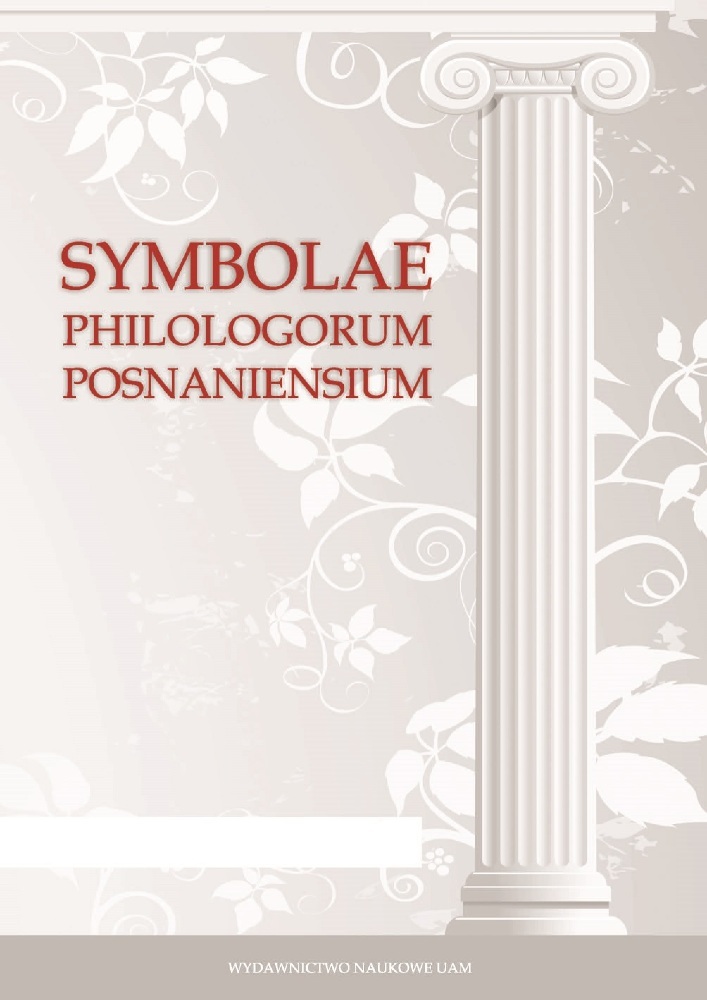Abstrakt
The first eulogy addressed to the Polish poet Mathias Casimirus Sarbievius, printed in two different versions in 1630 and 1632, was written by Gilbertus Joninus, a Frenchman whose oeuvre shows he had a remarkable interest in Poland, sparked perhaps by the odes of Sarbievius, while both Jesuits were staying in Rome. In his ode to the Pole, Joninus displays a thorough knowledge of the addressee’s works, as he sums up the themes Sarbievius wrote about the most, such as the military victories of Poland’s leaders, or “the weapons of the heavenly Cupid”. Interestingly, these themes return in Joninus’ own works as well, which may imply that the Frenchman indeed was inspired by Sarbievius, much like, as Joninus writes, Horace was inspired by Melpomene. At the end of the ode, therefore, it is perhaps not surprising to find that Joninus feels the Polish Jesuit had actually surpassed his ancient example, and that he was a “not unworthy descendant of Orpheus”. Joninus’ comparison of Sarbievius with Horace, as well as his use of Hor. Od. IV, 3, would later be copied by numerous authors. What little differences there are between the 1630 and the 1632 versions of Joninus’ work mostly have to do with diversifying the author’s vocabulary, or else serve to make more sense of a given passage. The largest divergence, however, not only makes the poem refer to Hor. Od. IV, 3 more clearly, but may also have genuine implications for our reading of the text. In the second edition, as opposed to the first, Sarbievius is compared to both Horace and Melpomene, and Joninus may furthermore be alluding to another aspect of Horace’s ode, saying that the Pole is either loved in Rome, or despised there. Two years after the poem’s first edition, Joninus seems to have had an even higher opinion of his Polish colleague, and he may have added an extra level of interpretation to his ode altogether.
Bibliografia
G. Joninus, Gilberti Ionini Arverni è Societate Iesu Odarum Libri IV. & Epodon I., Lyons 1630.
M.C. Sarbievius, Mathiae Casimiri Sarbievii e Soc. Iesu Lyricorum Libri IV. Epodon Lib. Unus Alterq. Epigrammatum, Antwerp 1632.
M.K. Sarbiewski, Liryki oraz Droga rzymska i fragment Lechiady, trans. T. Karyłowski, ed. M. Korolko, Warszawa 1980.
A. Borowski, Iter Polono-Belgico-Ollandicum. Cultural and literary relationships between the Commonwealth of Poland and the Netherlands in the 16th and 17th centuries, Kraków 2007.
E. Buszewicz, Sarmacki Horacy i jego Liryka: Imitacja – Gatunek – Styl. Rzecz o Poezji Macieja Kazimierza Sarbiewskiego, Kraków 2006.
A. Corbeill, Thumbs in Ancient Rome: Pollex as Index, “Memoirs of the American Academy in Rome” 42 (1997), 1–21.
K. Estreicher, Bibliografia Polska, vol. VIII, Kraków 1901.
K. Fordoński and P. Urbański (eds.), Casimir Britannicus. English translations, paraphrases, and emulations of the poetry of Maciej Kazimierz Sarbiewski, London 2010.
D.H. Garrison, Horace. Epodes and Odes, A New Annotated Latin Edition, Norman 1991.
J.P. Guépin, Casimirus Sarbievius, E rebus humanis excessus: Ode II 5, “Bzzlletin” 144 (1987), 58–59.
J. IJsewijn, “Mathias Casimirus Sarbievius, Ad Amicos Belgas”, in: E. Ulčinaitė (ed.), Mathias Casimirus Sarbievius in cultura Lithuaniae, Poloniae, Europae. Materies conventus scientific internationalis anniversario quadringentesimo a die natali Poetae dedicati Vilnae, 19–21 Octobris,
A.D. MCMXCV, Senosios literatūros studijos, Vilnius 1998, 25–50.
T.S. Johnson, A Symposion of Praise. Horace Returns to Lyric in Odes IV, Madison 2004.
N.T. Kennedy, Pindar and Horace, “Acta Classica” 18 (1975), 11–13.
W. Ludwig, Der Ritt des Dichters auf dem Pegasus und der Kuss der Muse – zwei neuzeitliche Mythologeme, Göttingen 1996.
J.J. Mertz, J.P. Murphy, and J. IJsewijn (eds.), Jesuit Latin Poets of the Seventeenth and Eighteenth Centuries. An Anthology of Neo-Latin Poetry, Wauconda 1989.
M. van der Poel and P. Tuynman, Sarbievius – Hooft – Horatius: Een lyrisch troostdicht?, in: Z. von Martels, P. Steenbakkers, and A. Vanderjagt (eds.),
Limae labor et mora. Opstellen voor Fokke Akkerman ter gelegenheid van zijn zeventigste verjaardag, Leende 2000, 145–157.
D. Sacré, ‘Etiamsi in tuas laudes totum conspiret Belgium’. Aspects of Sarbievius’s Nachleben, in:
E. Ulčinaitė (ed.), Mathias Casimirus Sarbievius in cultura Lithuaniae, Poloniae, Europae. Materies conventus scientific internationalis anniversario quadringentesimo a die natali Poetae dedicati Vilnae, 19–21 Octobris, A.D. MCMXCV, Senosios literatūros studijos, Vilnius 1998, 109–133.
E. Schäfer, Deutscher Horaz: Conrad Celtis – Georg Fabricius – Paul Melissus – Jacob Balde. Die Nachwirkung des Horaz in der neulateinischen Dichtung Deutschlands, Wiesbaden 1976.
C. Sommervogel, Bibliothèque de la Compagnie de Jésus, vol. IV, Bruxelles/Paris 1893.
J. Starnawski, Sarbiewski i jego belgijscy przyjaciele, “Meander” 50, no. 1–2 (1995), 45–66.
K. Stawecka, Adresaci liryków Sarbiewskiego, “Meander” 30, no. 1 (1975), 37–54.
A. Thill, Sarbiewskis Höhenflug als Medium zwischen Horazischer und moderner Dichtung, “Wolfenbütteler Barock-Nachrichten” 20 (1993), 28–33.
J. Warszawski TJ, “Dramat Rzymski” Macieja Kazimierza Sarbiewskiego TJ (1622–1625). Studium literacko-biograficzne, Rome 1984.
K. Zubowski, Zebrane wiersze (...), vol. I, Warszawa 1786.
Licencja
